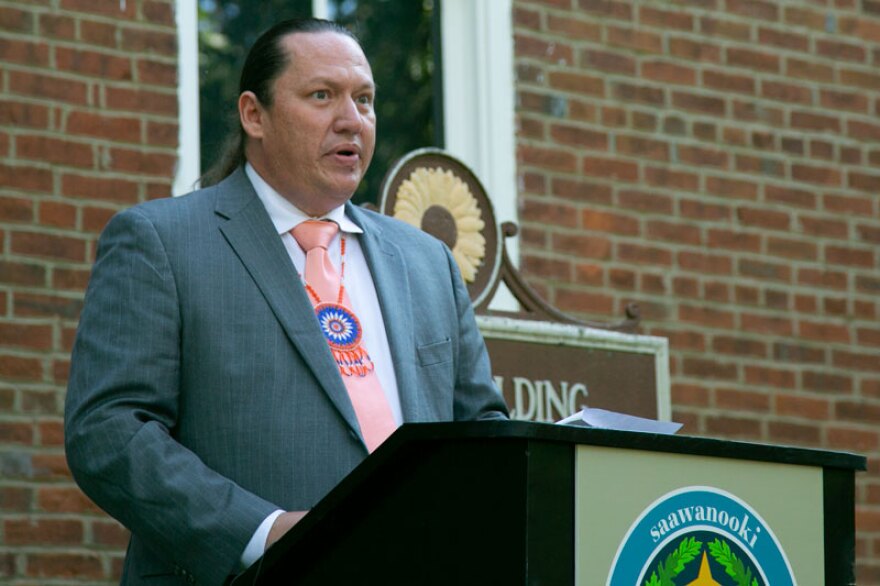A study at the Shawnee Indian Mission in Fairway aimed at looking for potential unmarked graves of Native American children is “on hold indefinitely” after Shawnee Tribe officials reportedly raised concerns about the project.
In a joint statement Tuesday, the city of Fairway, which operates the state-owned historic site, and the Kansas Historical Society, said the ground-penetrating radar study would be put on hold.
The statement went on to say that the study’s delay was prompted in part after Shawnee Tribe Chief Ben Barnes contacted the University of Kansas, which would be conducting the ground-penetrating work, to request the study be stopped.
Barnes did not immediately respond to the Post’s requests for comment.
The Shawnee Mission Post had scheduled a phone interview on Wednesday morning with Barnes through his communications team, but they did not pick up when the Post called. Any comments from Barnes will be added to this story if and when we receive them.
The city and society’s announcement also said that they now anticipate Barnes and the Shawnee Tribe may work to push legislation in Topeka aimed at conveying, or transferring, the mission’s lands from the state to the Shawnee Nation, a move KHS says it opposes.
“The KHS is on record opposing such a conveyance due to its historical significance to Kansas not just while it operated as the manual labor training school but due to other events and time periods as they related to Kansas’s history,” the joint announcement reads. “Further, Chief Barnes has not made any commitments about what he and the Shawnee Nation view as the future use of the land if they become owners of the site.”
According to the city and historical society’s joint announcement, KHS offered Barnes a formal role consulting on the project in August 2022 before work on the study began, but Shawnee Tribe officials have said they were not consulted.
According to Tuesday’s announcement, the Shawnee Tribe is the only tribe to object to any project at the site while other tribes that had children once enrolled at the school have expressed interest in a study being conducted.

A full version of the announcement can be found here.
A year ago, the Shawnee Tribe and the city of Fairway announced a partnership with the intent of investigating the history of the Shawnee Indian Mission, which was once known as the Shawnee Indian Manual Labor School.
Barnes, at that time, said he and other officials had a “moral obligation” to search for potential unmarked graves of Native American children, who were separated from their families and enrolled in the school in the decades leading up to the Civil War.
Fairway City Administrator Nathan Nogelmeier told the Post at that time that discussions of a partnership began in spring 2021.
The move to inspect the mission’s grounds came as the U.S. Department of Interior announced a nationwide initiative to investigate federally-operated Indian boarding schools — which did not include places like the Shawnee Indian Manual Labor School, which was founded and run by Methodist minister and Johnson County namesake Thomas Johnson.
The GPR study announced earlier this month came after the Shawnee Tribe received a $25,000 grant for historical research at Shawnee Indian Mission in April.
Other recent efforts to investigate the site include a Truth and Healing Commission on Indian Boarding School Policies, co-sponsored by U.S. Rep. Sharice Davids.
Stacey Halfmoon, the Shawnee Tribe’s executive director of cultural and historic preservation, told the Post in a response Tuesday evening that the tribe is “heartened by the University of Kansas’s decision to place this project on hold and by their commitment to ensuring it is done the right way or not at all.”
Halfmoon said the approach that Fairway and the State Historic Preservation Office took for the study “was wrong from the start” add ing that “there has been no consultation or even acknowledgement of the cultural sensitivity involved with doing something like searching for the graves of deceased Native children.”
“It is important to know the truth about what happened to these children, but it is also important that the search for those answers reflects the seriousness of the endeavor,” Halfmoon said.
This story was originally published on the Shawnee Mission Post.





